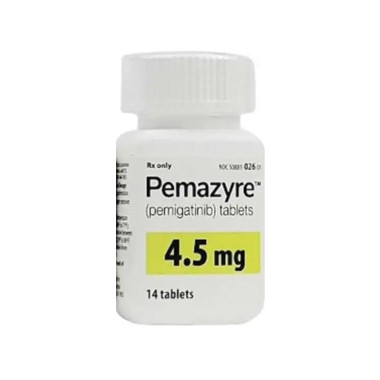How Effective Is Pemigatinib (达伯坦培米替尼) for Treating Cancer? A Detailed Analysis

How Effective Is Pemigatinib (达伯坦培米替尼) for Treating Cancer? A Detailed Analysis
For patients with cholangiocarcinoma (bile duct cancer) or FGFR2-altered non-small cell lung cancer, Pemigatinib (达伯坦培米替尼, brand name: Pemazyre) represents an important advancement in targeted therapy. This article examines its clinical efficacy, safety profile, and future potential to help patients make informed treatment decisions.
What Is Pemigatinib Used For?
Pemigatinib is an FGFR (fibroblast growth factor receptor) inhibitor approved for:
✔ Cholangiocarcinoma with FGFR2 fusions/rearrangements
✔ Non-small cell lung cancer (NSCLC) with FGFR2 mutations
It works by blocking abnormal FGFR signaling, which drives cancer growth in these patients.
Key Benefits of Pemigatinib Treatment
1. Clinical Effectiveness
Tumor response: In trials, ~36% of cholangiocarcinoma patients saw tumor shrinkage (vs. <5% with chemotherapy).
Progression-free survival (PFS): Median PFS of 7–9 months in responders.
Durable responses: Some patients maintain control for over 1 year.
2. Precision Targeting
Unlike chemotherapy, pemigatinib selectively attacks cancer cells with FGFR abnormalities, sparing healthy tissue.
3. Oral Administration
Taken as a daily pill, offering convenience over IV therapies.
Safety and Side Effects
Most side effects are manageable and include:
Fatigue (45% of patients)
Nail/skin changes (e.g., dry skin, hair loss)
Mild diarrhea or nausea
Increased phosphate levels (requires monitoring)
Severe risks (rare but possible):
Eye problems (retinal detachment risk)
Liver enzyme elevations
Patients should report:
✔ Vision changes
✔ Persistent nausea/fatigue
✔ Unusual bruising/bleeding
Cost and Accessibility
Price: ~¥50,000–¥80,000/month (varies by region/insurance).
Genetic testing required: Confirm FGFR alterations before use (~¥3,000–¥5,000).
Insurance coverage: Some plans cover pemigatinib for approved indications.
Financial assistance programs may be available—ask your healthcare team.
Future Directions
Ongoing research explores:
Combining pemigatinib with immunotherapy/chemotherapy
Expanding use to other FGFR-driven cancers (e.g., bladder, gastric)
Q&A: Patient Concerns
Q1: How long until pemigatinib starts working?
A: Initial responses often appear within 2–4 months. Scans track progress.
Q2: Can I take pemigatinib if I don’t have an FGFR mutation?
A: No. It only works for FGFR-altered cancers. Confirm with genetic testing.
Q3: Are there alternatives if pemigatinib stops working?
A: Options may include other FGFR inhibitors (e.g., infigratinib) or clinical trials.
Key Takeaways
Pemigatinib offers meaningful benefits for FGFR2+ cholangiocarcinoma/NSCLC.
Side effects are typically mild but require monitoring.
Genetic testing is essential before treatment.
Work closely with your oncologist to determine if pemigatinib is right for you.
For personalized advice, consult Dingxiang Medical Service.
English Translation
How Effective Is Pemigatinib (达伯坦培米替尼) for Cancer?
Pemigatinib (达伯坦培米替尼, Pemazyre) targets FGFR2+ cholangiocarcinoma and NSCLC:
✔ 36% response rate in bile duct cancer
✔ 7–9 month average progression-free survival
✔ Oral dosing, manageable side effects
Cost: ~¥50,000–¥80,000/month. FGFR testing required.

